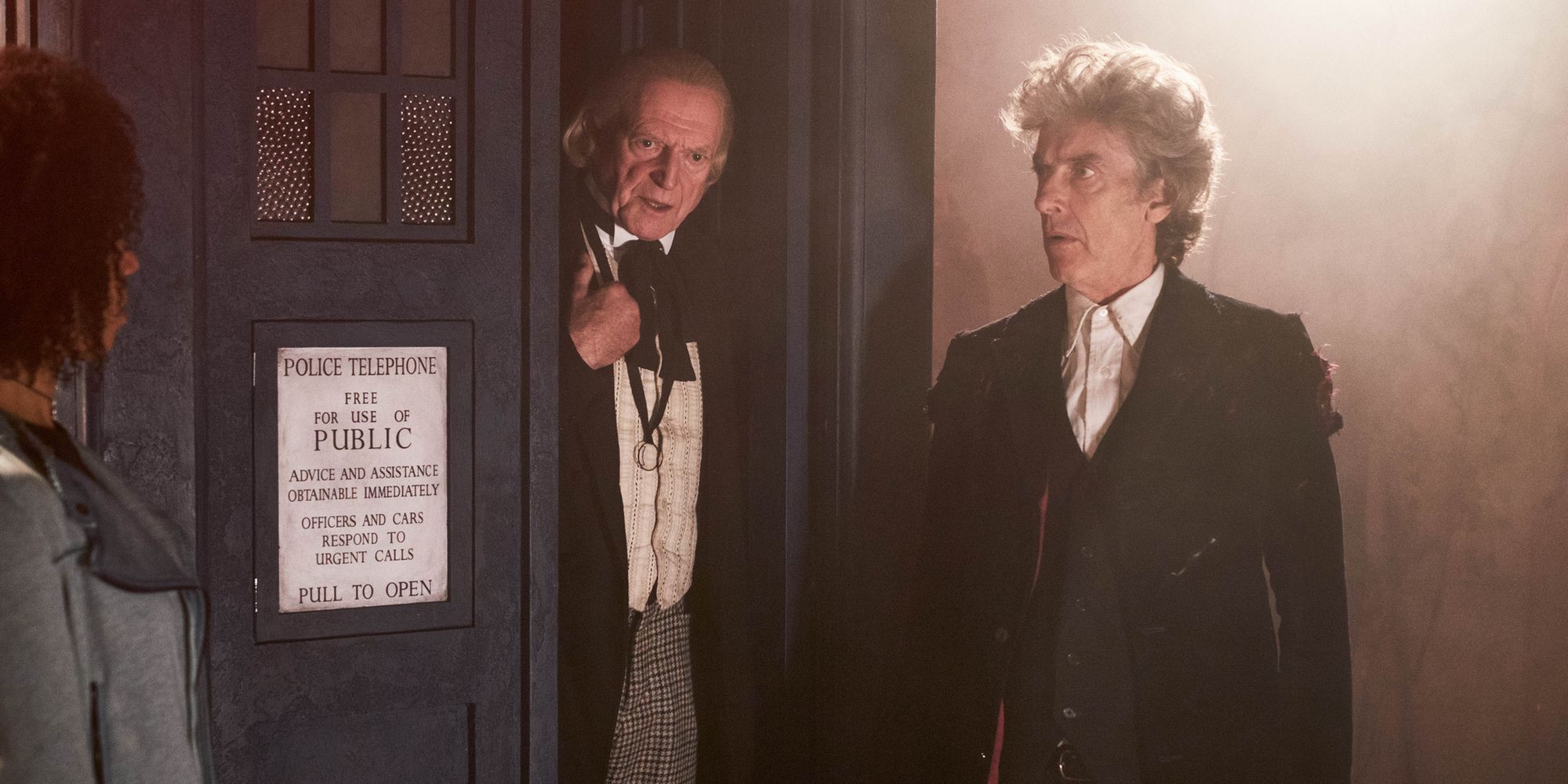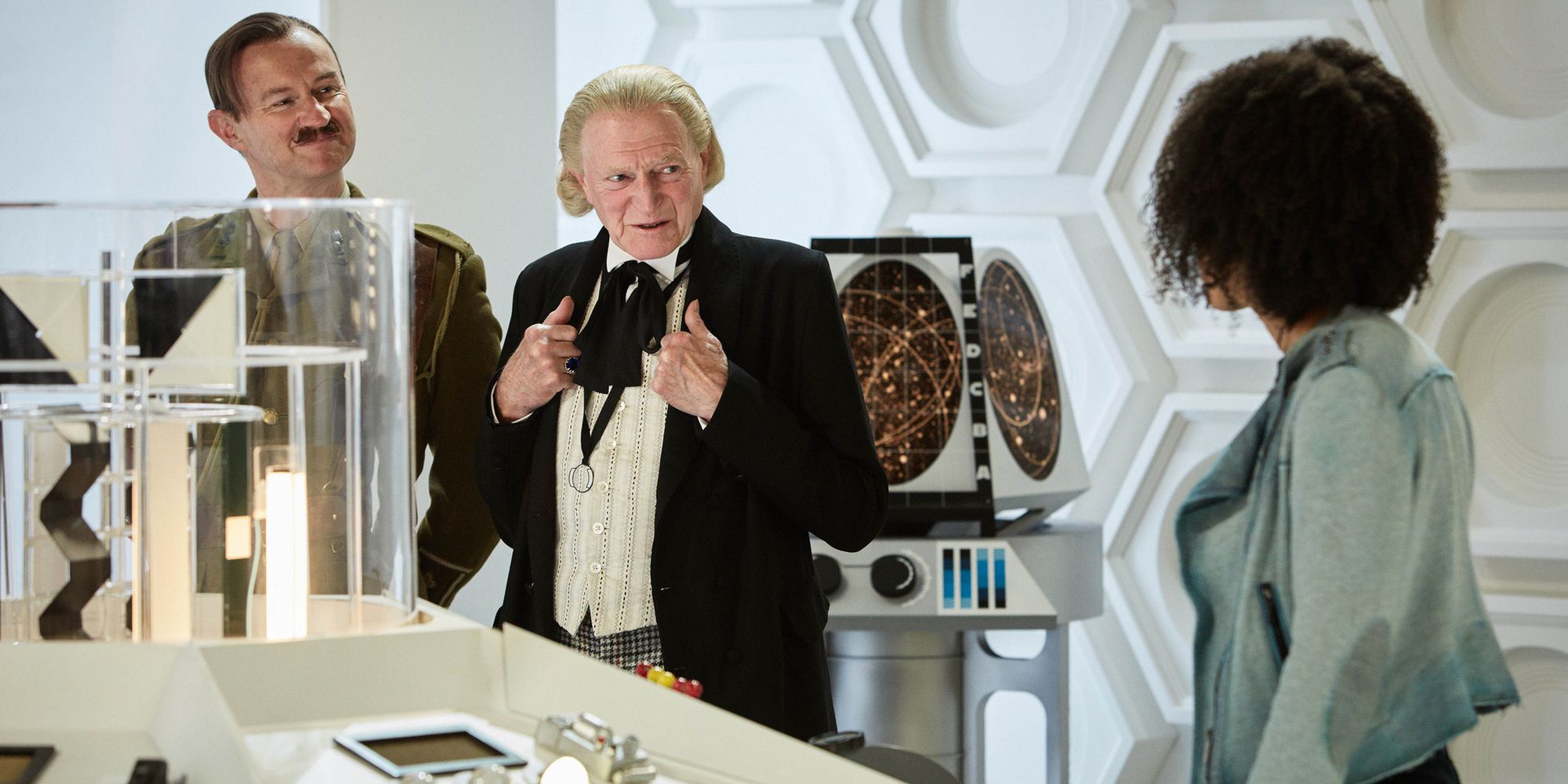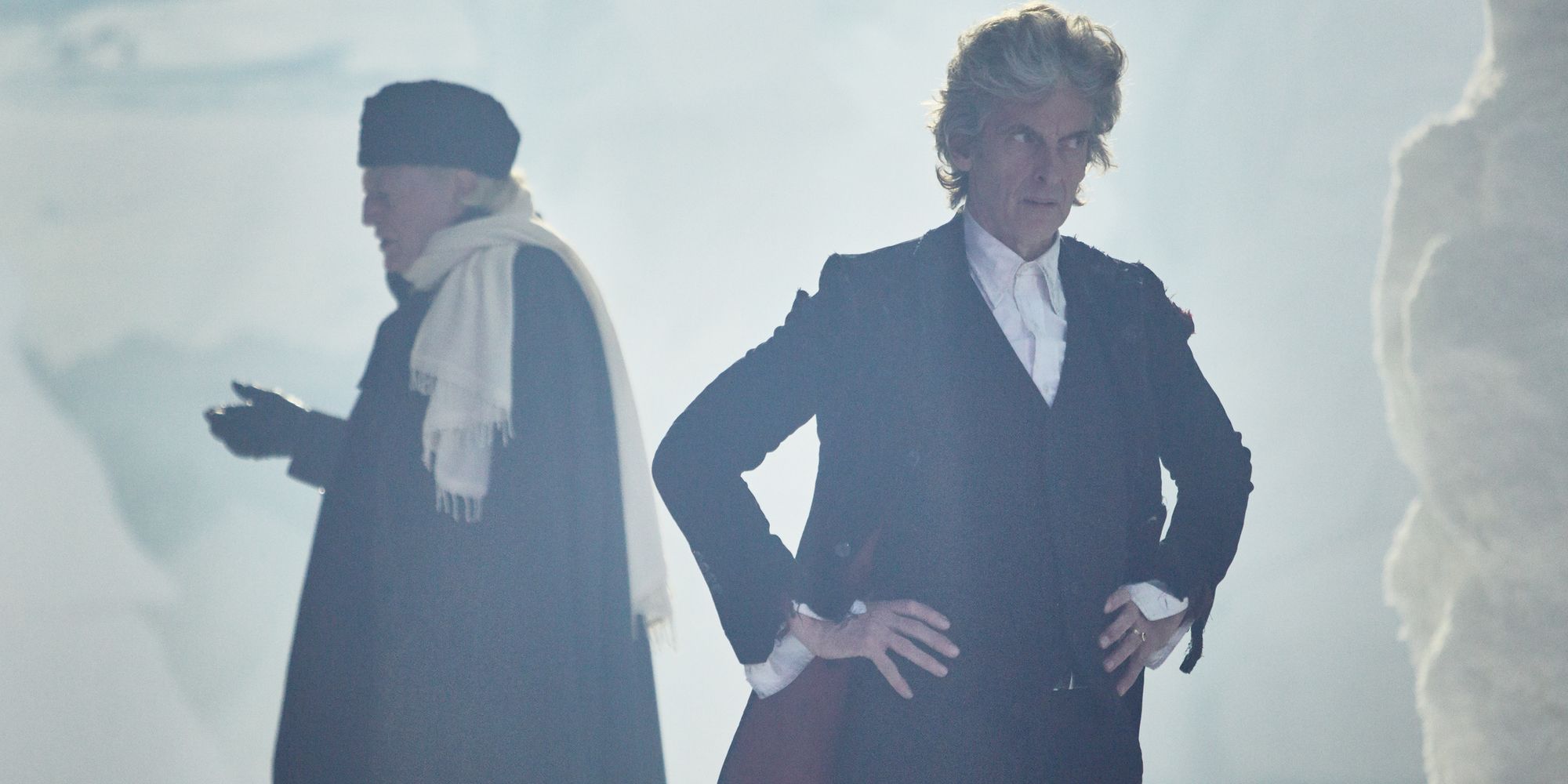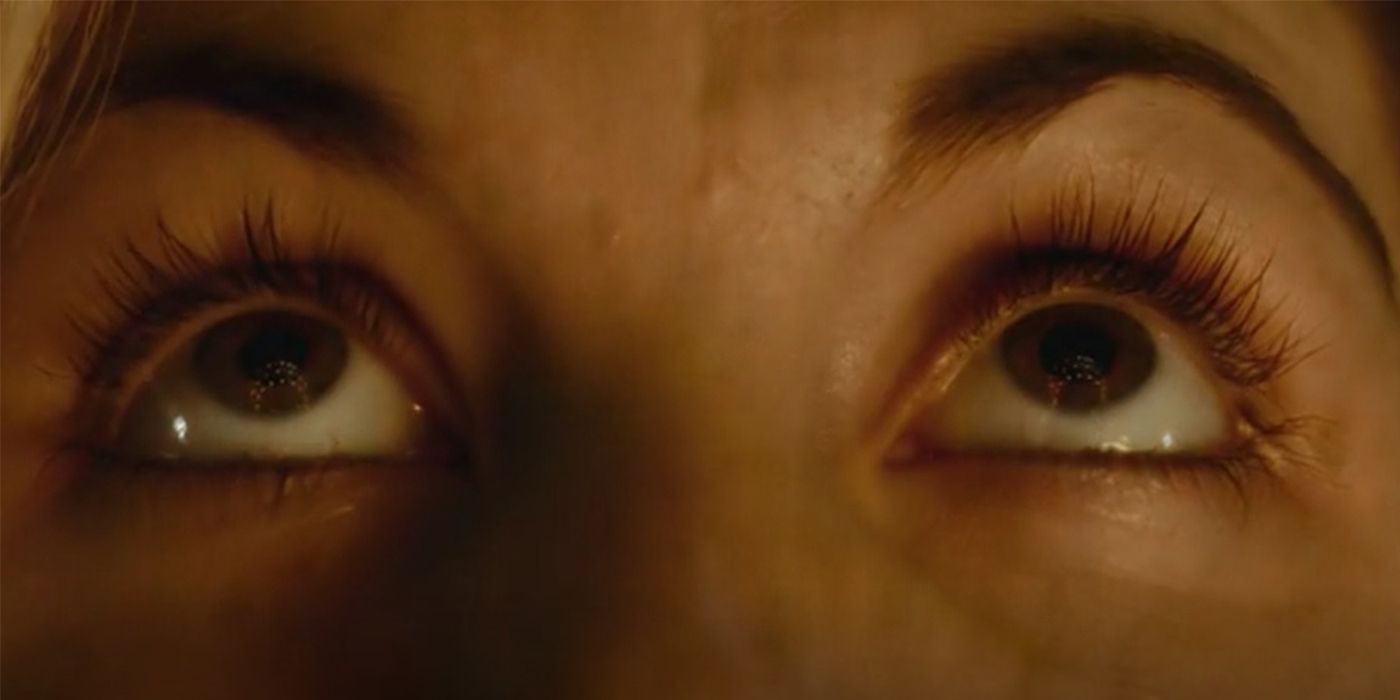By any measure, the Doctor Who Christmas Special was a tremendous success. In the UK, "Twice Upon A Time" was watched by 5.7 million people on Christmas Day, and it successfully introduced the world to Jodie Whittaker's 13th Doctor. Unfortunately, for all the episode triumphed in terms of the ratings, it also had real flaws. It was an unusual episode, both Peter Capaldi's swan song as the Doctor and a remarkable multi-Doctor story. As a result, it failed to make the most of two tremendous Doctors.Why The Two Doctor Story Should Have Been Great (This Page)
A Multi-Doctor Arc Has A Very Simple Purpose
Multi-Doctor stories are traditional special events in Doctor Who history. The first, "The Three Doctors", aired in 1972 and 1973 to celebrate the 10-year anniversary of the show. A decade later, the show celebrated its 20-year anniversary with another multi-Doctor plot. Most recently, "The Day of the Doctor" was released as the largest ever simulcast of a TV drama, in honor of the 50th anniversary. Only 1985's "The Two Doctors" wasn't an anniversary episode.
RELATED: Doctor Who Christmas Special Review: The Series Embraces Change
The real draw for a multi-Doctor story is always the dynamic between the stars. Ever since 1972, the tradition has been for different incarnations of the Doctor to squabble and bicker; they'll point out one another's foibles and quirks, mock the size of one another's chins or shoes, and each will try to upstage the other. Given Doctor Who tends to reinvent itself with every regeneration, multi-Doctor episodes also allow fans to recognize how the show has changed. In the true spirit of Doctor Who, they bring past and present together.
The Two Doctors
Oddly enough, this is the second time another actor has portrayed William Hartnell's Doctor. Richard Hurndall played the role in "The Five Doctors", although in practice he didn't really take the time to act much like Hartnell. At the time, the BBC could be confident that few fans would have actually watched First Doctor episodes recently. There were no points of comparison.
Nowadays, classic Doctor Who is a big business and the DVDs top seller, so they needed to get an actor who could accurately portray Hartnell's Doctor. For "Twice Upon a Time", they chose David Bradley, who'd already played Hartnell already back in a 2013 drama exploring the early days of Doctor Who. As such, Bradley had studied the actor, with his take displaying many of Hartnell's small affectations. He really does create a sense of the First Doctor, and it's testament to Bradley's skill - after all, where most Doctors get to redefine the role around their own skills and style, Bradley is simply modeling his approach on Hartnell.
RELATED: Steven Moffat Gave Us The Best And Worst Of Doctor Who
Further, the dynamic between Bradley and Capaldi is fantastic. Both are at the same point in their respective lives, battling against the need to regenerate and tempted to choose death rather than change. The First Doctor needs to learn what his future holds and to get a sense of hope. The Twelfth Doctor needs to be reminded why he does the things he does and to believe that he gives others hope. The symmetry is beautiful and poignant.
The Christmas' Special Plot Is Too Busy
Unfortunately, this brings us to a major problem with "Twice Upon A Time". The draw for a multi-Doctor story is not the plot; that is typically just a device to bring the Doctors together. The story is all about the Doctors, and how their characters interact. Unfortunately, departing showrunner Steven Moffat tends to over-complicate his plots. He most certainly demonstrates that weakness with here, and it distracts from the episode's main concept.
The 60-minute episode is far too busy. The two Doctors are just one of the main plot threads. In addition, there's the Colonel, plucked out of the trenches of the First World War. The mystery of the Testimony must be revealed, linked to a possible traitor plot centered around Bill. Along the way, Moffat also has a random side-trip to the 'Good Dalek.' Finally, there's the need to say farewell to Capaldi's Doctor, and to bring an end to the entire Moffat era. Add a sprinkle of fan-service to that - the Colonel's name, for example - and it's simply too much for an hour.
Worse still, the plot is relatively inaccessible to anyone who hasn't been watching Doctor Who over the past few years. A multi-Doctor arc is, on paper, a perfect jumping-on point for new or lost fans. Unfortunately, this episode is tradition-heavy: it begins with a "previously" that could only happen on Doctor Who; "709 Episodes Ago..."; if you haven't watched the Capaldi run, you won't know why there's a 'Good Dalek' in the first place; and the farewell scenes rely on an intimate understanding of long-forgotten relationships. The nod to Lethbridge-Stewart is another appropriate homage to the late, great Nicholas Courtney - but it just adds another layer of inaccessibility to casual viewers. Worse still, the episode telegraphed many of the twists and reveals to long-term fans, meaning they didn't serve as much of a surprise for those in on it.
Related: When Will Jodie Whittaker's First Season of Doctor Who Air?
The concept behind "Twice Upon A Time" is fantastic, bringing together two different Doctors and forcing them to learn from one another. It's hampered by an overly complex, relatively inaccessible plot.
The Regeneration Doesn't Fit The Story
The last ten minutes of "Twice Upon A Time" are poignant and beautiful, a summary of the entire Capaldi run. Modern Doctor Who has always taken an emotional approach to regeneration, treating a handover story as a farewell moment. Eccleston confronted the Daleks, and ended with a broad grin. Tennant was given the chance to travel around and say his goodbyes. Smith's whole final season built up to the Battle of Trenzalore. These are powerful, emotional stories.
Oddly, there's little precedent for that kind of approach in classic Doctor Who. Hartnell's regeneration, glimpsed in "Twice Upon A Time", was a relatively sedate affair. The closest is probably Peter Davidson's swan song, "The Caves of Androzani", arguably the most powerful story in his entire run. That was a difficult regeneration, with the Doctor undergoing visions of friends who try to persuade him to go on and live, and of the Master, who commanded him to die.
Plainly, the modern regeneration story is a celebration of the last Doctor's entire run, a moment where his fans can appreciate everything he (or, going forwards, she) has achieved. This fundamentally clashes with a multi-Doctor arc, which should always be focused on the character interaction between the two Doctors. It's brilliant to finally see Whittaker in the role, but for something clearly intended to be part of the story, it doesn't gel.
-
"Twice Upon A Time" could go on to be regarded as a highlight of the Capaldi era for much of what it attempts. It was an enjoyable story, one that truly celebrated Capaldi's Doctor. Unfortunately, at the same time, an overly complex plot meant the episode never quite lived up to its potential. The multi-Doctor arc sits uncomfortably with the idea of a modern regeneration story, and as a result it leaves viewers with an awkward, uncomfortable plot.
Next: Peter Capaldi & Jodie Whittaker Regeneration Scene: Meet the 13th Doctor





